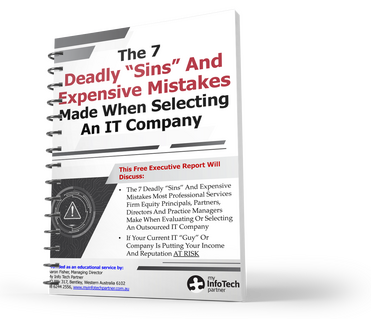 You might read the headline of this article and think, “That has to be an exaggeration.” Unfortunately, it’s not. Every single day, small to medium professional services practices are targeted by cybercriminals. These criminals look for vulnerable victims, then attack.
You might read the headline of this article and think, “That has to be an exaggeration.” Unfortunately, it’s not. Every single day, small to medium professional services practices are targeted by cybercriminals. These criminals look for vulnerable victims, then attack.
This is the world we live in today. It’s one where cybercriminals regularly take advantage of small practices. Why small practices? They’re the favourite target of hackers, scammers and other cybercriminals because small practices have a bad habit of NOT investing in cyber security.
Hackers have many methods they use to break into your network, steal data or put you in a position where you have to pay them money to get your data back. They use a combination of software and skill to make it happen. Here are three ways hackers and cybercriminals attack your network in an attempt to get what they want.
1. THEY GO THROUGH YOUR TEAM MEMEBERS.
That’s right, they’ll use your own team members against you, and your team might not even realise what’s happening. Let’s say a hacker gets ahold of your internal e-mail list, like the e-mails you have posted on your website or LinkedIn. All the hacker has to do is send an e-mail to everyone at your firm.
The e-mail might be disguised as a message addressed from you asking your team for a gift card, which is becoming an increasingly common scam. Another e-mail tactic is making a message look like it’s from a fellow team member, asking everyone else to open an attached file, which is likely malware or ransomware. A third e-mail scam is directing people to a phishing website, which is a website that scammers have designed to look like popular websites in order to get login information to hack accounts. All it takes is a single click from any team member to let the bad guys into your practice.
2. THEY ATTACK YOUR NETWORK DIRECTLY.
Some hackers aren’t afraid of forced entry. Hackers and cybercriminals have access to black market tools and software that helps them get into networked devices – particularly unprotected networked devices.
For example, if you have a PC that’s connected to the Internet and your network doesn’t use any firewalls, data encryption or other network protection software, a hacker can break in and steal data from that PC and potentially other devices connected to that PC, such as portable hard drives. This method of entry isn’t necessarily easy for hackers, but the effort can be worth it, especially if they can walk away with sensitive financial information.
3. THEY HOLD YOUR DATA HOSTAGE.
Hackers are relying on ransomware more and more to get what they want. Hackers rely on e-mail, executable files and fraudulent web ads (such as banner ads and popups) to attack networks with ransomware. It goes back to the first point. All it takes is someone clicking a bad link or file and the next thing you know, you’re locked out of your network.
This has happened to dozens of practices and even city governments in the last year alone. The thing is that even if you pay the ransom, there is no guarantee the hacker will restore access. They can take the money and delete everything, leaving your practice high and dry! This destroys firms!
All of these points are why you need to take a hard look at IT security solutions and use them. For instance, if you had all of your data securely backed up to the cloud and a hacker came in and tried to hold your data hostage, you wouldn’t have to worry. They don’t really have your data. You can tell them “no,” then all you’d have to do is work with an IT team to get your network back up and running while scrubbing it of any malware or ransomware. Then, it would be a simple matter of restoring data from the cloud. Sure, you might be out of commission for a day or two, but in the grand scheme of things, it’s much better than losing your practice to these jokers.
Hackers are just looking for easy targets and, sadly, a lot of small practices fit the bill. Just because you haven’t had any major problems yet doesn’t mean you won’t in the future. The threats are out there and they’re not going to go away. Invest in security, partner with an IT security firm and protect yourself. This is one investment that is truly worth it!





 Contact Us On
Contact Us On



